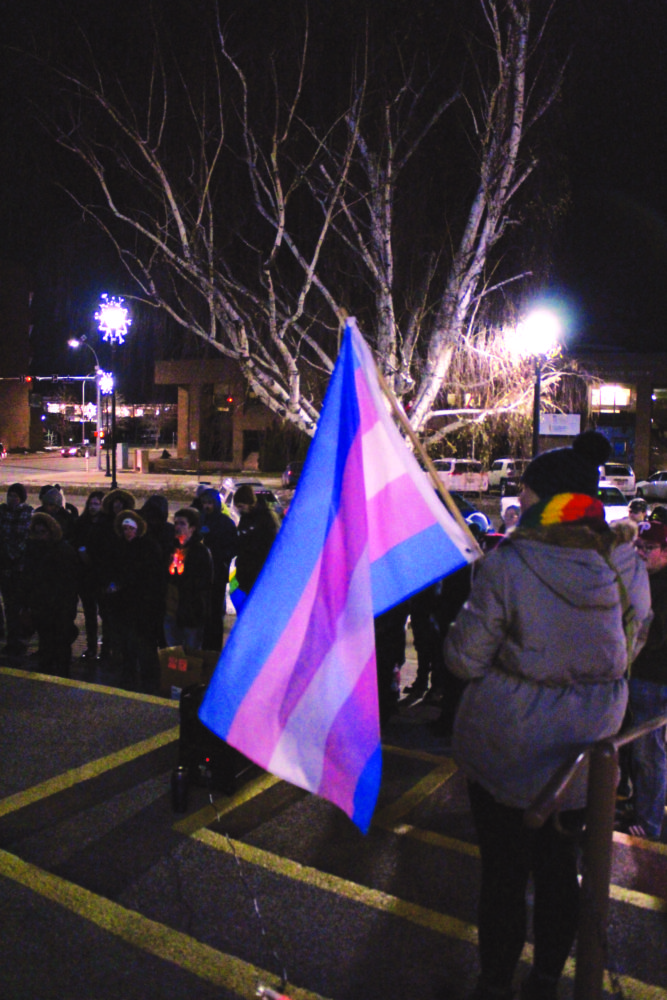“Living life as trans is never easy, we are continually having to defend and justify our own existence.”
This quote was taken from a speech by Jayce Wilson, a transgender woman using she/her pronouns who attended Lethbridge’s Transgender day of remembrance on Nov. 20.
A day in honour of transgender people from all over the world who have died at the cause of hate crimes or bigotry, an unfortunate circumstance around the world, which has seen a rise recently in this new political climate.
According to its info page, the Transgender Day of Remembrance serves several purposes, mainly raising public awareness of hate crimes against transgender people by reading their names aloud to a slew of allies and bystanders alike.
The main purpose of the event from the beginning has always been to memorialize transgender individuals, TDOR’s website supports not only self-identified members of the transgender community — that is, as a transsexual, crossdresser, or otherwise gender-variant, but others as well.
The event is held in November to honor Rita Hester, a member of the community whose murder on Nov. 28th, 1998 kicked off the “Remembering Our Dead” web project and a San Francisco candlelight vigil in 1999. Hester’s murder — like most anti-transgender murder cases — has yet to be solved.

Sabra Owen shelters her candle from the wind during a vigil on November 20, 2017 in support of transgender induviduals and allies who have been murdered at the response of a hate crime or other bigotry from all over the world.
According to Mara Kiesling from the National Centre for Transgender in the United States, the characteristics often found in the stereotypical victim share a lot with the characteristics of a trans person,
“These are all characteristics of people in the United States who are more susceptible to violence, of people who are more marginalized economically and educationally, people who end up having a bullseye on their back.” Says Kiesling.
When it comes to the false reports of crimes against transgender people, Kiesling says many of these crimes are not only pushed away, but completely uninvestigated.
“A lot of jurisdictions report zeroes, even in places where we know there are hate crimes,” said Keisling.
She adds that numbers are often misreported too. Incidents may not be determined to be hate crimes because there was no investigation.
Transgender people are four times more likely than the general population to report living in extreme poverty, making less than $10,000 per year, a standing that sometimes pushes them to enter the dangerous trade of sex work according to Marie Claire.
Nearly 80 per cent of transgender people reported experiencing harassment at school when they were young. Bustle reports that as adults, some report being physically assaulted in public places, in front of bystanders.
Greater awareness has not yet translated into broad acceptance says Kris Hayashi, executive director of the Transgender Law Centre
“The majority of society does not understand who transgender people are in ways that lead to the violence and the murder and the harassment that we’re seeing.”
With the rise in hate crimes being seen, not just around the world but right at our doorsteps, Wilson says that for her, the most important thing is people showing up in support of not only trans people in Lethbridge, but those who have been affected by this discrimination all over the world.
“To see so many of my trans siblings wanting to come out, wanting to read names (was meaningful). I had put out a few requests to get people to read names (of the murdered trans individuals this year), but I didn’t expect such a response.”
In regards to advice for young trans people who might feel a sense of fear coming out during this rough time around the world, Wilson says
“You are not alone, and when you are ready, reach out.”
Trans hotline Canada can be reached at (877) 330-6366.





